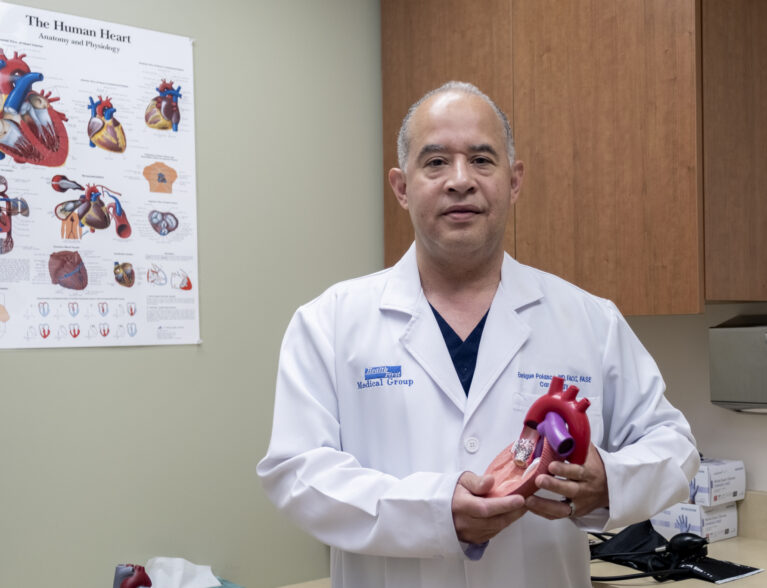
How would you like to suffer from a condition that causes you to have a fast heart rate, dizziness and fatigue when you stand up after lying down, and then discover that doctors aren’t able to diagnose the problem?
That’s what most people suffering from POTS – postural orthostatic tachycardia syndrome – deal with since many doctors are not familiar enough with the syndrome to identify it and there are no laboratory tests to confirm it.
Dr. Enrique Polanco is on the staff of Health First’s Holmes Regional Medical Center in Melbourne and is board-certified in internal medicine, adult comprehensive echocardiography, nuclear cardiology and cardiovascular disease. He says POTS is a relatively new diagnosis, and he didn’t hear anything about the syndrome in medical school, from which he graduated in 1995. That began to change 15 years later.
“Since 2009-10, information about it has exploded,” says Polanco, “and I have learned a lot from patients who did their own research as they sought answers as to what was wrong with them that doctors were missing.”
Since it involves multiple systems in the body, many doctors still don’t have training in enough fields to make a diagnosis. POTS may require specialists in cardiology, neurology, gastroenterology and even immunology to fit the pieces of the puzzle together.
The average diagnostic delay for a POTS patient is 5 years, 11 months. Only 25 percent of patients seeking help are diagnosed within the first year of symptoms.
According to Cleveland Clinic, the body’s autonomic nervous system balances your heart rate and blood pressure to keep your blood flowing at a healthy pace, no matter what position your body is in. If you have POTS, your body can’t coordinate the balancing act of blood vessel constriction and heart rate response when you get up from a prone position.
This means that your body can’t keep your blood pressure steady and stable, which causes a variety of symptoms, including:
- heart palpitations (feeling the heart pound or race)
- instability (feeling like one is about to fall)
- lightheadedness (almost passing out; vision tunnels or goes gray or dark)
- dizziness
- fainting
- feeling tired
- chest pain
- trouble getting enough breath
Sheena Smith, who is 37 and lives in Palm Bay, had a long and arduous journey on her way to a POTS diagnosis. “I’m 37, and my symptoms began when I was 15,” she says. During the height of the pandemic, Smith contracted COVID-19 and ended up with long COVID.
One recent study found nearly 80 percent of people with long COVID had POTS. That statistic clued in Smith and her doctors. “COVID gave me the answers I was looking for,” she said.
“Until then, doctors told me anxiety was causing my symptoms.”
Unfortunately, far too often the input patients receive from healthcare providers undermines what they are feeling, says Dr. Polanco. “They’re anxious because of their symptoms and the fact they have no idea what is causing them. When I tell them, ‘You’re not crazy – what you have is real,’ the mere fact that I’m validating that there really is something wrong is a huge relief. Sometimes they break down in tears because they finally have an answer.”
When her primary care physician sent Smith to a cardiologist to check out her racing heartbeat, a correct diagnosis was missed. After she had bariatric surgery and was plagued with severe constipation, the surgeon told her it was normal to be constipated – another missed diagnosis. Eventually, her doctor suggested Smith see Dr. Polanco, who finally confirmed the elusive diagnosis by giving her a Tilt Table Test, the results of which can confirm POTS.
Mayo Clinic describes the benefits of a Tilt Table Test to diagnose anyone suffering from fainting, light headedness or dizziness. The patient lies flat on a table that has a footboard and is strapped in to prevent falling or slipping. Sticky patches (electrodes) on the chest, arms and legs are connected to an electrocardiogram machine that monitors heart rate. A blood pressure monitor or cuff checks blood pressure during the test. An IV line is inserted into a vein in your arm for delivering drugs, if needed.
The results of a tilt table test are based on whether you faint during the test and what happens to your blood pressure and heart rate. The presence of POTS is indicated by decreasing blood pressure that causes dizziness or fainting during the test. In Smith’s case, she also vomited. A negative result is indicated if the heart rate increases only slightly, blood pressure doesn’t drop significantly, and there are no signs or symptoms of fainting.
Dr. Polanco currently has 100-plus POTS patients. “I do basic testing for lupus, scleroderma, hypothyroidism and multiple sclerosis [as part of his diagnostic procedure].
POTS is very complicated and it’s important to determine what it isn’t. I partner with a rheumatologist, a neurologist and a gastroenterologist. I’d love to add a geneticist to that group who would help with testing.
“It takes a long time,” he adds. “Patients have so many symptoms. But with trial and error, the correct medication and good lifestyle choices, patients can get better.”
For her part, all of Sheena Smith’s research and hard work have paid off. “I avoid caffeine,” she says. “Standing in the shower stimulates my heart rate but sitting is OK. I carry salt packets and drink sports drinks with zero sugar, but never water since it can deplete electrolytes and nutrients.”
Enrique Polanco, MD, is board-certified in internal medicine, adult comprehensive echocardiography, nuclear cardiology, and cardiovascular disease. Dr. Polanco received his medical degree from Pontificia Universidad Catolica, Madre y Maestra in Santiago, Dominican Republic, and completed his residency at Wayne State University/Detroit Medical Center in Michigan and a fellowship in general cardiology at Loyola University Medical Center in Maywood, Illinois. He is accepting new patients at Health First Medical Group–Gateway, 1223 Gateway Drive, Suite 2F, Melbourne: 321-312-3487.



